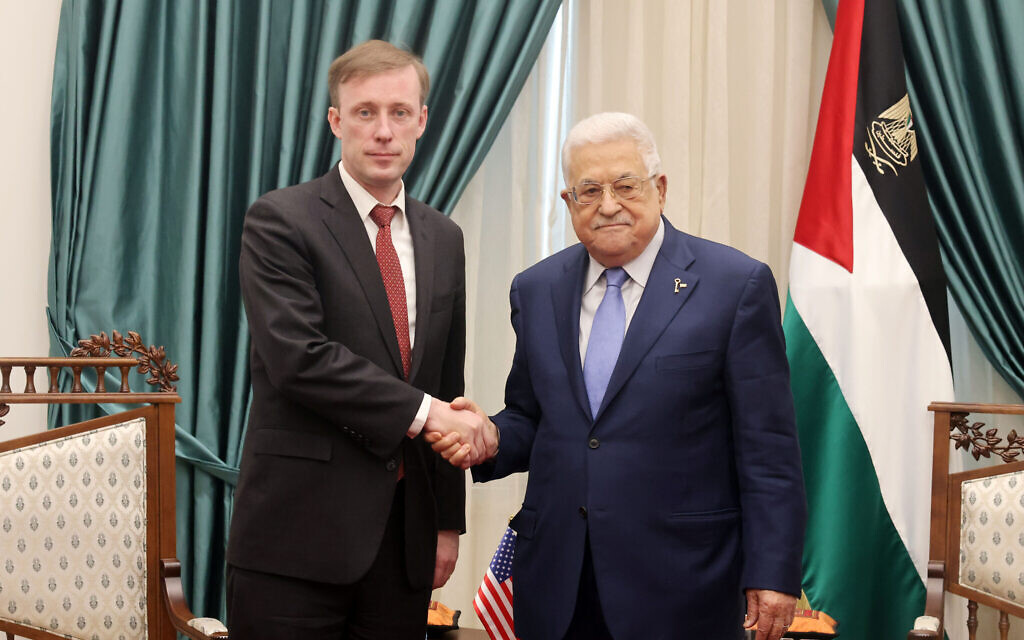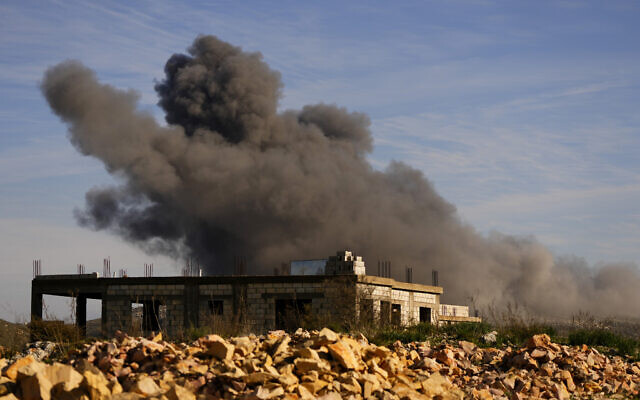



US National Security Adviser Jake Sullivan reiterated the US’s stance that the Palestinian Authority should be responsible for governing Gaza at the end of Israel’s war with Hamas, but acknowledged that the government body would need to undergo significant changes to be fit to do so.
Sullivan, who is currently in Israel for a wartime visit with top Israeli officials, addressed the issue of who will govern Gaza at the end of Israel’s war with Hamas during a press conference on Friday.
Israel has routinely rejected the idea of the Palestinian Authority taking up the reins, something which Sullivan did not address during the press briefing, choosing instead to discuss the US’s position.
“We do believe that the Palestinian Authority needs to be revamped and revitalized, needs to be updated in terms of its method of governance, its representation of Palestinian people,” he said.
“That will require a lot of work by everybody who is engaged in the Palestinian Authority, starting with the president, Mahmoud Abbas, who I will go to see… And ultimately, it’s going to be up to the Palestinian people to work through their representation.”
Sullivan traveled to Ramallah later on Friday to meet with Palestinian Authority President Mahmoud Abbas.
On Thursday, a Palestinian official told The Times of Israel that the PA could fulfill the security vacuum in Gaza initially by being able to “re-activate” at least 3,500 of some 15,000 former members of its security forces in the Strip.
The figure was reached in an assessment that the PA conducted in recent weeks amid a US-encouraged effort for it to eventually return to governing Gaza after losing elections to Hamas in 2005 and being booted from the Strip two years later, the official said.
More former Gaza-based PA troops will eventually be able to bolster the first several thousand but they and others will need additional training, the official added.
A senior Biden administration official briefing reporters said, “There are a number of security personnel in Gaza linked to the Palestinian Authority, which we think might be able to provide some sort of nucleus in the many months that follow the overall military campaign.”
The official added that the PA security forces have “performed incredibly well” in the West Bank, thwarting an effort by Hamas to use cells in the territory to “instigate violence and uprising in the days after October 7.”
Through its US Security Coordinator in Jerusalem Gen. Mike Fenzel, the US has helped train the PA security forces and its work with them has continued through October 7, the senior administration official said.
Israel’s war with Hamas in Gaza was triggered by the deadly onslaught on October 7 in which thousands of Hamas-led terrorists burst into Israel from the land, air and sea, killing more than 1,200 people and seizing some 240 hostages.
In response, Israel launched an aerial campaign and subsequent ground invasion, vowing to eliminate Hamas from the Gaza Strip and end their 16-year rule.
Sullivan stressed during the press conference that there is no disagreement between Jerusalem and Washington that the fight against Hamas will take months, and added that both sides agree that there will be a transition from the current high-intensity phase of the war to one of precision operations.

The White House has had very good discussions on the timeline and the transition to the next phases of the conflict, he said, adding: “We’re not here to tell anybody you must do X, you must do Y.”
Reports in recent days have claimed the White House is pressing Israel to end the current phase within weeks, due to concerns for the mounting civilian toll in the Strip.
Sullivan said of the reports that during his meetings with Israeli leaders, he didn’t hear them “say things that would lead me to feel I need to answer the hypothetical question” of how Washington will respond if the current phase drags on.
He added that his Israeli counterparts “very much indicated” their goal to distinguish civilians from combatants and prevent harm to innocents.
The Hamas-run health ministry in Gaza has claimed that some 18,700 people have been killed by Israel since the start of the war, mostly civilians. This number cannot be independently verified and is believed to include some 7,000 Hamas and Hamas-affiliated terrorists, as well as civilians killed by misfired Palestinian rockets.
Sullivan criticized Hamas on Friday for their tactic of using human shields to defend themselves against the IDF, something which the terror group has been known to do for as long as it has governed Gaza.
By hiding among civilians, Sullivan said, Hamas has placed “an incredible burden on the IDF, a burden that is unusual for a military in today’s day and age.”
Israel “doesn’t have the opportunity to meet Hamas on a field of battle in a way in which civilians are off to one side and the terrorists are off to the other side,” he said.
On October 7, Hamas “massacre[d] 1,200 people in a brutal and savage way,” Sullivan continued. “They then turned around and went back into Gaza and hid behind a civilian population, using civilians as human shields, using protected sites like hospitals and schools for military purposes, embedding themselves among the innocent Palestinian people,” while vowing to commit more attacks and destroy Israel.
On the subject of civilian casualties, he said that while Israel has the crucial responsibility to protect civilians and facilitate humanitarian aid to civilians, Hamas’s ultimate responsibility for the conflict “has been lost a little bit in this whole debate.”
Moving away from Gaza, Sullivan turned his attention to Israel’s northern border, where attacks led by the Iran-backed Hezbollah group have been constant since the start of the war in Gaza, and where daily exchanges of fire with the Iran-backed group, as well as allied Palestinian factions, have raised fears of a broader conflagration.
Discussing the concern of a potential larger conflict between Israel and Hezbollah, Sullivan told reporters that if the Lebanese terror group does not remove its forces from the border, Israel will have to “deal with the threat.”
“The citizens of Israel who have been evacuated from the north have to be able to return to their homes and have to be able to do so with a true sense of security,” he said.

Washington still believes that “the threat can be dealt with through diplomacy and does not require the launching of a new war,” Sullivan said, but added that it also requires “deterrence as well, because we need to send a clear message that we will not tolerate the kinds of threats and terrorist activity that we have seen from Hezbollah and from the territory of Lebanon.”
So far, the skirmishes on the Lebanon border have resulted in four civilian deaths on the Israeli side, as well as the deaths of six IDF soldiers. On the Lebanese side, more than 120 have been killed, according to an AFP tally.
Hezbollah on Wednesday said three more of its members were killed, bringing the group’s stated toll to 103 — some of whom were killed in Syria.
Looking further afield, Sullivan said that Yemen’s Houthi rebels are a “threat to freedom of navigation to commercial shipping,” after the Iran-backed group claimed responsibility for a series of attacks in recent weeks.
“The United States is working with the international community, with partners from the region and from all over the world to deal with this threat,” Sullivan told journalists, and added that “while the Houthis are pulling the trigger, so to speak, they’re being handed the gun by Iran.”
On Friday, a Liberian-flagged cargo ship caught fire in the Red Sea after being hit by a projectile launched from rebel-controlled Yemen, a US defense official and a private intelligence firm said.
The attack on the Al Jasrah further escalates a campaign by Yemen’s Iranian-backed Houthi rebels, who have claimed responsibility for a series of missile assaults in recent days that just missed shipping in the Red Sea and its strategic Bab el-Mandeb Strait.
The attacks are a response to the Israel-Hamas war, though the links to the ships targeted in the rebel assaults have grown more tenuous — or nonexistent — as the attacks continue.
On Thursday, the Houthis fired a ballistic missile that missed a container ship traveling through the strait, and the day before that, two missiles fired from Houthi-held territory missed a commercial tanker loaded with Indian-manufactured jet fuel near the key Bab el-Mandeb Strait. Also near the strait, a missile fired by Houthis on Monday night slammed into a Norwegian-flagged tanker in the Red Sea.
Also on Friday, Sullivan met with President Isaac Herzog in Tel Aviv. In their meeting, they discussed the ongoing efforts to secure the release of the hostages, a statement following their meeting read.

It added that Herzog conveyed the importance of protecting the citizens of the south and north of Israel, and Iran’s continued efforts to destabilize the region.
On Thursday, Sullivan met with Mossad chief David Barnea at the Mossad headquarters in Tel Aviv, the Prime Minister’s Office said Friday.
The two discussed efforts to return hostages held in Gaza, increased cooperation and regional challenges posed by Iran through its nuclear program, expansionism and support for terror, the statement says.
